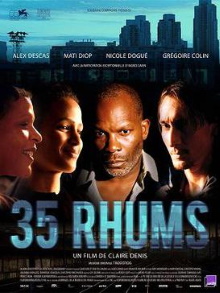Here’s another shot at a film by Claire Denis even though we keep not quite being able to get what critics love so much about her work. This one is a very subtle film, perhaps too subtle as it seems almost bereft of any plot, but after getting to know its characters, it comes closest to a film by this director that I actually like. It also presents a view of the Parisian suburbs that is almost completely inhabited by people of color. That isn’t directly relevant to the themes or the characters but it still is a rather startling portrayal of France.
Lionel makes a living as a train driver on the Parisian regional RER network and is a single parent raising his daughter Josephine. She is an anthropology student and works part-time at a music store. The two share an unusually close relationship as father and daughter and seem to exclude others. A neighbor Gabrielle, who works as a taxi driver, wants to be a romantic partner to Lionel and a mother to Josephine but the father and daughter seems to want to keep her as a friend. Another neighbor Noé has inherited his parents’ penthouse unit in the same building. He is ambiguously Josephine’s boyfriend but is flaky and often absent. Lionel and Josephine profess to be content with their lives and to always be devoted to taking care of one another, yet Lionel is aware that Josephine is now a grown woman and must live her own life. His feelings on the matter are further brought into focus with the retirement of a colleague at work.
This film works wonderfully as a gentle portrayal of a working class community outside of Paris. It’s quite rare to have a view of Parisian residents who are neither rich white elites nor embittered banlieue toughs, just regular people living their lives. Even as I enjoyed getting to know the characters though, I kept waiting for the actual story to start and it does feel a little underwhelming to realize that there really isn’t any plot. It’s an almost pure study of the characters’ emotions and living situation. It even deliberately underplays what would be dramatic moments in the hands of another director: the group having their car breakdown while going to a concert; Lionel and Josephine visiting her mother’s grave and so on. It’s all so subtle and understated. Denis claims that this film was inspired by Yasujirō Ozu’s Late Spring. One can indeed see the similarities in retrospect but the film has such a light touch that it’s hard to make the connection while watching it. This technique does make the characters feel more like real people but then this is not the kind of film that engages the emotions either. It’s instead a cerebral film that calls for patience and careful consideration.
The film’s cinematography is by Agnès Godard who is a frequent collaborator of Denis but I find that I loved this film’s look far more than Beau Travail. The understated style of the film helps accentuate the quiet beauty of everyday life in the mundane suburbs such as Lionel driving the train, or the group of friends being caught in the rain. The decision to have almost every character a person of color seems striking at first but soon enough feels natural and makes for a powerful statement that there is no reason why they aren’t considered as French as a random group of white people. The film pointedly delves into Josephine’s heritage later and it’s quite a surprise to learn that her mother was German. It’s another way that the director wants to challenge our expectations on identity.
While I do like much more than Beau Travail and I feel that Denis’ and Godard’s work here seems like a much more natural fit than an African setting, I still don’t like her films as much as critics seem to. Even while I understand what she is trying to do and appreciate her craft, the films just don’t really resonate with me. That makes the prospect of watching more of her work unappealing even though I know that she wins a lot of plaudits.
